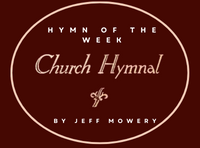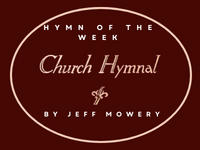Until Then
My heart can sing when I pause to remember a heartache here is but a stepping stone
Along a trail that’s winding always upward, This troubled world is not my final home.
Chorus
But until then my heart will go on singing, Until then with joy I’ll carry on,
Until the day my eyes behold the city, Until the day God calls me home.
The things of earth will dim and lose their value If we recall they’re borrowed for awhile;
And things of earth that cause the heart to tremble, remembered there will only bring a smile.
This weary world with all its toil and struggle may take its toll of misery and strife;
The soul of man is like a waiting falcon; When it’s released, it’s destined for the skies.
I chose this particular hymn, not only because I like the tune, but because it contained two simple words in the English language that are not only hard to define, but really don’t have a lot of meaning when used by themselves or together. Think about it. Can you tell me what “until” means? Can you define “then?” The author of this hymn takes these two simple words, combines them, and in an eloquent way gives us a few things to ponder:
- “Trail that’s winding always upwards” – Have you ever been hiking in the mountains? Have you noticed that there are typically three kinds of trails (easy, medium, and hard)? Typically, the harder the trail, the better the view when you reach the top of it. The kind of physical shape I am in usually determines the trail I chose. If I am in shape, I don’t mind climbing the harder trails. The same kind be said of our lives. We have a heavenly destination and we are on a trail winding upwards. Along the way, there may be times where we can pause, look back on our lives, and enjoy the views. But, we should always be climbing towards something. We shouldn’t try to “coast” down hill or always chose the “easy” trail, but should recognize that the ultimate prize will be worth the toil of the journey. If we aren’t “in shape” to handle the more difficult trails in life, then we need to invest the time and energy to build our spiritual strength, and trust in the Lord to provide the strength needed for the daily challenges we face.
- “Borrowed for awhile” – What do you own “free and clear?” Clothes, furniture, your car, maybe even your house? But do we really “own” these things or are they, as the hymn states, “borrowed” for a while? Maybe the better question for us is “Are you a steward of anything or, more importantly, a good steward of anything?” The Bible teaches us that “The Earth is the Lord’s.” He owns everything. What we think we “own” can be taken away as quickly as tomorrow in many cases (our house can be destroyed by a tornado, our stock market investments can plummet in one day, or our car can be totaled in a car accident). However, the right perspective is that we don’t own anything. They are “on loan” to us. Everything we have is the Lord’s, and if we truly understand that truth, our perspective on “things” really changes. If we are stewards, not owners, we recognize we have a responsibility to someone else for how we manage those things.
In the Old Testament, the Israelites were taken into captivity in Babylon. There is a passage of Scripture related to the Babylonian exile found in Jeremiah 29 where the Lord gives the people some rather “odd” instructions on how to live while they are in exile. He tells them to marry, have children, build houses, plant crops, etc. These people had been uprooted from their homes, and were probably longing to return to the Holy Land. He didn’t tell them to build a memorial of the Holy Land or replicate in Babylon what they had in Israel. He gives them instructions to live normal lives and do normal things. God also told them the captivity was going to last 70 years, and told them to not listen to prophets that told them any different. Although they probably didn’t like to hear it, they weren’t going to go back “until” the 70 years were over. He gave them commands to live a certain way “until” He would return them to the Promised Land. In this same passage of Scripture while the people are living in exile, the Lord says to them “I know the plans I have for you. Plans to prosper you and not to harm you. Plans to give you a hope and a future.” The questions for us are “What are we doing while we wait?” “How do we respond when God tells us until then?” “Do we know the Lord has a plan for us during difficult times?” This hymn reminds us that no matter the circumstance in our life, there are things we can do as followers of the Lord while we wait. We can constantly sing His praises because He is praiseworthy – “my heart will go on singing.” We can live a life filled with joy – “with joy I’ll carry on.” Not because everything in life is “hunky-dory,” but because we know where we are going and we know God has a plan for us. We are going to Heaven. Another old hymn says “I am bound for the Promised Land” and it is a reminder that we, too, are going to a “Promised Land.” This world is not our final destination, but only a stepping stone on the trail that is leading upwards. So I encourage you, no matter what you might be going through, to sing an old hymn (and maybe even a contemporary chorus), and to live a life filled with joy “until then” (whenever “then” may be).

